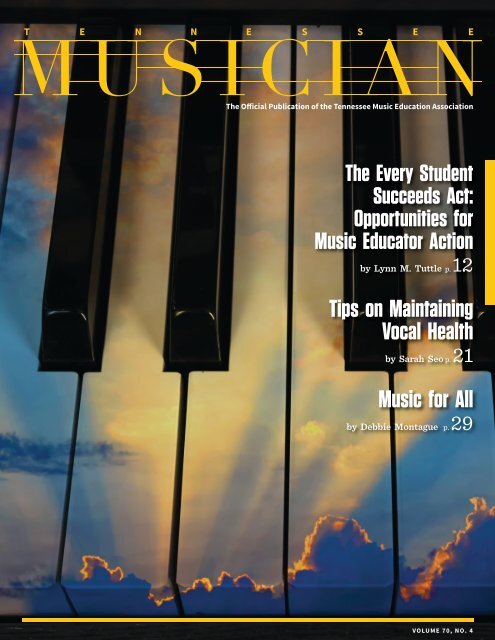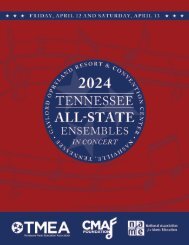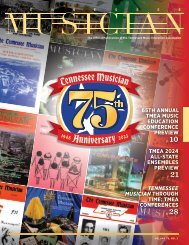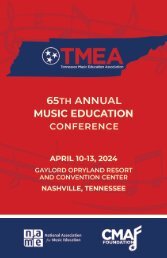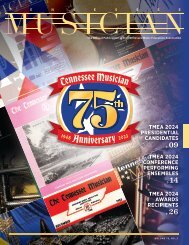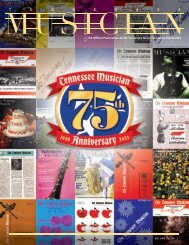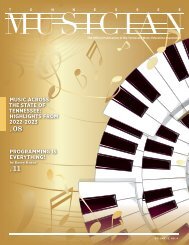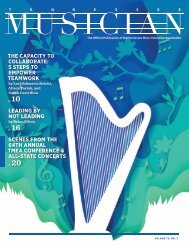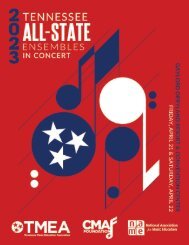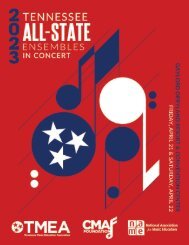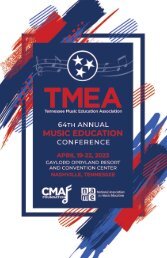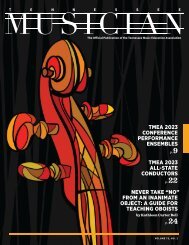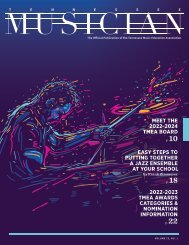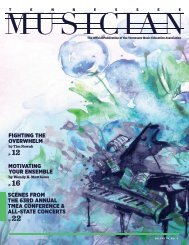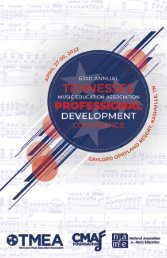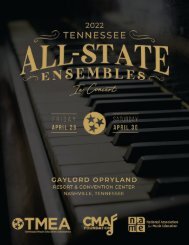TN Musician Vol. 70 No. 4
You also want an ePaper? Increase the reach of your titles
YUMPU automatically turns print PDFs into web optimized ePapers that Google loves.
The Official Publication of the Tennessee Music Education Association<br />
The Every Student<br />
Succeeds Act:<br />
Opportunities for<br />
Music Educator Action<br />
by Lynn M. Tuttle p. 12<br />
Tips on Maintaining<br />
Vocal Health<br />
by Sarah Seo p. 21<br />
Music for All<br />
by Debbie Montague p. 29<br />
VOLUME <strong>70</strong>, NO. 4
MUSIC<br />
MUSIC WITH PURPOSE<br />
A Christ-centered university in southeast<br />
Tennessee with faculty, curriculum, facilities,<br />
and opportunities to prepare you for your<br />
goals as tomorrow’s musician.<br />
Audition Dates:<br />
NOV. | JAN. | FEB. | MAR. | APR.<br />
LEEUNIVERSITY.edu/music
TENNESSEE MUSICIAN EDITORIAL STAFF<br />
Michael W. Chester<br />
Managing Editor and Advertising Manager<br />
Justin T. Scott<br />
Associate Editor<br />
Laura Boucher<br />
Associate Style Editor<br />
Jazmin Jordan<br />
Social Media Director<br />
Allison Segel-Smith<br />
Pre-Production Editor<br />
Contributing Editors<br />
Matthew Clark<br />
Doug Phillips<br />
Carol King-Chipman<br />
Jerome Souther<br />
PUBLISHED BY SLATE GROUP<br />
6024 45th Street<br />
Lubbock, Texas 79407<br />
(800) 794-5594 office<br />
(806) 794-1305 fax<br />
Director of Creative Services<br />
Rico Vega<br />
Graphic Design<br />
Kasey McBeath<br />
Account Executive<br />
Ian Spector<br />
TABLE OF CONTENTS | 2018 | VOLUME <strong>70</strong>, NO.4<br />
TMEA President’s Message 4<br />
Johnathan Vest, Ed. D.<br />
TMEA Conference Awards & President-Elect 5<br />
FEATURED ARTICLES<br />
The Every Student Succeeds Act:<br />
Opportunities for Music Educator Action 8<br />
by Lynn M. Tuttle<br />
Tips on Maintaining Vocal Health 16<br />
by Sarah Seo<br />
Music for All 23<br />
by Debbie Montague<br />
Tennessee <strong>Musician</strong> Advertiser Index 31<br />
TMEA Back Then 32<br />
All editorial materials should be sent to: Michael Chester, Managing<br />
Editor (615-873-0605) E-mail: editor@tnmea.org.<br />
Submit materials by e-mail in Microsoft Word format.<br />
Advertising: Information requests and ad orders should be<br />
directed to: Michael Chester, Managing Editor (615-<br />
873-0605) e-mail: editor@tnmea.org. All advertising<br />
information is on the TMEA web site, www.tnmea.org.<br />
Deadlines for advertisement orders and editorial materials:<br />
Issue <strong>No</strong>. 1 – Deadline: August 15 (in home delivery<br />
date October 15); Issue <strong>No</strong>. 2 – Deadline: October 15 (in<br />
home delivery date December 15); Issue <strong>No</strong>. 3 – Deadline:<br />
December 15 (in home delivery date March 15);<br />
Issue <strong>No</strong>. 4 – Deadline: February 15 (in home delivery<br />
date May 15)<br />
Tennessee <strong>Musician</strong> is copyrighted. Reproduction in<br />
any form is illegal without the express permission of<br />
the editor.<br />
Postmaster: Send address changes to: Tennessee <strong>Musician</strong>,<br />
c/o National Association for Music Education<br />
(NAfME), 1806 Robert Fulton Drive, Reston, VA<br />
20191-4348.<br />
The Tennessee <strong>Musician</strong><br />
The Official Publication of the Tennessee Music Education Association<br />
The Tennessee Music Education Association (TMEA) was officially formed in 1945 as a voluntary, nonprofit<br />
organization representing all phases of music education at all school levels. The mission of TMEA<br />
is to promote the advancement of high quality music education for all. Active TMEA membership is<br />
open to all persons currently teaching music and others with a special interest or involvement in music<br />
education. Collegiate membership and retired memberships are available. Membership applications are<br />
available on the TMEA web site, www.tnmea.org.<br />
The Tennessee <strong>Musician</strong> was founded in 1948 with J. Clark Rhodes appointed by the TMEA Board of<br />
Control as inaugural editor. Tennessee <strong>Musician</strong> was preceded by an earlier publication, Tennessee<br />
Music Editors’ Downbeat, which was discontinued by the TMEA Board of Control at the spring board<br />
meeting, held in Chattanooga, Tennessee in 1948. Tennessee <strong>Musician</strong> is published by Slate Group –<br />
Lubbock, Texas and is mailed to members four times each year at an annual subscription rate of $6.00<br />
(included in dues). <strong>No</strong>n-member subscription rate (includes S&H): $30.00 per school year; single<br />
copies: $10.00 per issue<br />
Place non-member subscription and single copy orders at TMEA, 129 Paschal Drive, Murfreesboro,<br />
Tennessee 37128 or e-mail to editor@tnmea.org.<br />
All editorial materials should be sent to: Michael Chester, Editor-in-Chief (615-904-6771 ext. 31600)<br />
e-mail: editor@tnmea.org. Submit materials by e-mail in Microsoft Word format.<br />
<strong>No</strong>n-Profit 501(c)(3) Organization U.S. Postage Paid<br />
at Lubbock, Texas. ISSN Number 0400-3332; EIN<br />
number 20-3325550
TMEA BOARD AND COUNCIL<br />
TMEA OFFICERS 2017-2018<br />
TMEA EXECUTIVE DIRECTOR:<br />
Ron Meers<br />
execdirector@tnmea.org<br />
TMEA PRESIDENT:<br />
Johnathan Vest, Ed. D.<br />
president@tnmea.org<br />
BOARD OF DIRECTORS<br />
TMEA STATE GENERAL MUSIC CHAIR:<br />
Linzie Mullins<br />
genmusicchair@tnmea.org<br />
TMEA STATE CHORAL CHAIR:<br />
Gerald Patton<br />
pattong@rcschools.net<br />
TMEA STATE ORCHESTRA CHAIR:<br />
Michelle Clupper<br />
michelle.clupper@knoxschools.org<br />
TMEA STATE BAND CHAIR:<br />
David Chipman<br />
banddir@bellsouth.net<br />
TMEA STATE HIGHER EDUCATION CHAIR:<br />
Ryan Fisher, Ph. D.<br />
rfisher3@memphis.edu<br />
TMEA COUNCIL<br />
WTGMEA PRESIDENT:<br />
Linzie Mullins<br />
genmusicchair@tnmea.org<br />
WTGMEA PRESIDENT-ELECT:<br />
Frances Miller<br />
fmiller@millingtonschools.org<br />
WTVMEA PRESIDENT:<br />
Lalania Vaughn<br />
lvaughn@rebelmail.net<br />
WTVMEA PRESIDENT-ELECT:<br />
Christopher Davis<br />
davischristophert@gmail.com<br />
WTSBOA PRESIDENT:<br />
Stephen Price<br />
prices@gcssd.org<br />
WTSBOA PRESIDENT-ELECT:<br />
Ollie Liddell<br />
ollie_liddell@hotmail.com<br />
MTGMEA PRESIDENT:<br />
Alexis Yatuzis-Derryberry<br />
derryberrya@rcschools.net<br />
MTGMEA PRESIDENT ELECT:<br />
Lia Holland<br />
liaholland@mtcscougars.net<br />
MTVA PRESIDENT:<br />
Michael Choate<br />
choatem@pcsstn.com<br />
TMEA PRESIDENT-ELECT:<br />
Lafe Cook<br />
pres-elect@tnmea.org<br />
2 | TENNESSEE MUSICIAN | 2017 | <strong>Vol</strong>ume 69, <strong>No</strong>. 2<br />
TMEA PAST-PRESIDENT:<br />
Jeff Phillips, Ed. D.<br />
jeffrey.phillips@sumnerschools.org<br />
TMEA STATE COLLEGIATE NAFME CHAIR:<br />
Jennifer Vannatta-Hall, Ed. D.<br />
jennifer.vannatta-hall@mtsu.edu<br />
TMEA STATE EDUCATIONAL TECHNOLOGY CHAIR:<br />
John Womack<br />
webmaster@tnmea.com<br />
TMEA PUBLICATIONS EDITOR AND<br />
ADVERTISING MANAGER:<br />
Michael Chester<br />
editor@tnmea.org<br />
TMEA PUBLICATIONS ASSOCIATE EDITOR:<br />
Justin Scott<br />
justin.scott@tcsedu.net<br />
TMEA ADVOCACY AND GOVERNMENT<br />
RELATIONS CHAIR:<br />
Christopher Dye, Ed. D.<br />
christopher.dye@mtsu.edu<br />
MTSBOA PRESIDENT:<br />
Debbie Burton<br />
dlburton98@gmail.com<br />
MTSBOA PRESIDENT-ELECT:<br />
Justin Scott<br />
justin.scott@tcsedu.net<br />
ETGMEA PRESIDENT:<br />
Margaret Moore<br />
mamcmoore57@aol.com<br />
ETGMEA PRESIDENT-ELECT<br />
Marcus Smith<br />
marcus.smith@knoxschools.org<br />
ETVA PRESIDENT:<br />
Kenton Deitch<br />
kenton.deitch@knoxschools.org<br />
ETVA PRESIDENT-ELECT:<br />
Stephanie Coker<br />
scoker@acs.ac<br />
ETSBOA PRESIDENT:<br />
Gary Wilkes<br />
gwilkes428@gmail.com<br />
ETSBOA PRESIDENT-ELECT:<br />
Alan Hunt<br />
ahunt@bradleyschools.org<br />
CONFERENCE MANAGEMENT TEAM<br />
TMEA CONFERENCE CO-CHAIR:<br />
Brad Turner<br />
brad.turner@acsk-12.org<br />
TMEA CO-CONFERENCE CHAIR:<br />
Paul Waters<br />
paulwaters.tmea@gmail.com<br />
TMEA CONFERENCE EXHIBITS CHAIR:<br />
Jo Ann Hood<br />
jhood10105@aol.com<br />
ALL-STATE MANAGEMENT TEAM<br />
<strong>TN</strong> ALL-STATE CHORAL GENERAL CHAIR:<br />
Amanda Ragan<br />
aragan@ortn.edu<br />
ENSEMBLE CHAIRS<br />
TREBLE HONOR CHOIR CHAIR:<br />
Tiffany Barton<br />
tntreblechoir@gmail.com<br />
<strong>TN</strong> ALL-STATE SATB ENSEMBLE CHAIR:<br />
Lauren Ramey<br />
lauren.ramey@wcs.edu<br />
<strong>TN</strong> ALL-STATE SSAA CHORALE ENSEMBLE CHAIR:<br />
Amanda Short<br />
amandalovellshort@gmail.com<br />
<strong>TN</strong> ALL-STATE TTBB CHORUS ENSEMBLE CHAIR:<br />
Kelly Davenport<br />
davenportk@wcde.org<br />
<strong>TN</strong> ALL-STATE 9TH - 10TH GRADE STRING<br />
ORCHESTRA CHAIR:<br />
Andy Smith<br />
andy.smith@sumnerschools.org<br />
PROJECT CHAIRS<br />
TMEA MEMBERSHIP CHAIR:<br />
Position unfulfilled at this time<br />
TMEA GUITAR EDUCATION CHAIR:<br />
Chip Henderson<br />
paul.henderson@mtsu.edu<br />
TMEA JAZZ EDUCATION POLICY CHAIR:<br />
Richard Ripani, Ph. D.<br />
richard.ripani@mnps.org<br />
TMEA SOCIETY FOR MUSIC TEACHER<br />
EDUCATION CHAIR:<br />
Jamila L. McWhirter, Ph. D.<br />
jamila.mcwhirter@mtsu.edu<br />
TMEA MUSIC MERCHANTS<br />
INDUSTRY CHAIR:<br />
Rick DeJonge<br />
rick.dejonge@khsmusic.com<br />
TMEA CONFERENCE REGISTRATION CHAIR:<br />
Mark Garey<br />
mgarey86@comcast.net<br />
TMEA CONFERENCE PERFORMANCE<br />
GROUP CHAIR:<br />
John Mears<br />
mearsj@rcschools.net<br />
<strong>TN</strong> ALL-STATE INSTRUMENTAL<br />
GENERAL CHAIR:<br />
Todd Shipley<br />
allstateinstrumental@tnmea.org<br />
<strong>TN</strong> ALL-STATE 11TH - 12TH GRADE SYMPHONIC<br />
ORCHESTRA CHAIR:<br />
Jessica Peck<br />
peck_j@hcde.org<br />
<strong>TN</strong> ALL-STATE 9TH - 10TH GRADE CONCERT<br />
BAND CHAIR:<br />
Carter <strong>No</strong>blin<br />
john.baker@rcstn.net<br />
<strong>TN</strong> ALL-STATE 11TH - 12TH GRADE CONCERT<br />
BAND CHAIR:<br />
J.R. Baker<br />
john.baker@rcstn.net<br />
<strong>TN</strong> ALL-STATE JAZZ BAND CHAIR:<br />
Cord Martin<br />
corderyl.martin@gmail.com<br />
TMEA WEBMASTER:<br />
John Womack<br />
webmaster@tnmea.org<br />
TMEA TRI-M CHAIR:<br />
Anna Laura Williams<br />
anna.laura.williams@outlook.com<br />
TMEA MUSIC IN OUR SCHOOLS<br />
MONTH CHAIR:<br />
Tiffany Barton<br />
tntreblechoir@gmail.com<br />
TMEA HISTORY AND ARCHIVES CHAIR:<br />
Position unfulfilled at this time<br />
TMEA RETIRED TEACHERS CHAIR:<br />
Bobby Jean Frost<br />
bjfrost@aol.com
Compose Your Future<br />
www.etsu.edu/music<br />
www.Facebook.com/ETSUMusic<br />
@GoETSUMusic<br />
• Bachelor of Music Degrees in<br />
Performance, Education, and Jazz<br />
• Nationally recognized classical<br />
and contemporary ensembles<br />
• Competitive scholarships based<br />
on audition
TMEA PRESIDENT’S MESSAGE<br />
Johnathan Vest, Ed. D.<br />
I WANT TO THANK THOSE OF YOU WHO<br />
ATTENDED THE 2018 TMEA CONFERENCE,<br />
AND THANKS TO THOSE WHO COMPLETED<br />
THE POST-CONFERENCE SURVEY.<br />
End of the year concerts. Final exams. Allergies. Cleaning out and<br />
organizing. These are all signs of the end of school! Teachers use this<br />
time to reflect, rejuvenate and take part in professional development,<br />
and hopefully spend some much-needed time with family. It goes by<br />
quickly. Pretty soon, band camps will be in full swing and we will be<br />
planning for the 2018-2019 school year. I challenge all of you (and<br />
myself ) to take time for yourself this summer. We can’t be the best<br />
for our students unless we take care of ourselves.<br />
I want to thank those of you who attended the 2018 TMEA Conference,<br />
and thanks to those who completed the post-conference survey.<br />
Based on the feedback we received from that survey, and from<br />
talking with many of you, the conference was very successful. The<br />
performances, the clinicians and the presenters were all top-notch,<br />
and I hope that you were edified and uplifted both personally and<br />
professionally by having attended. Special thanks to the Country<br />
Music Association for supporting our conference this year.<br />
If you weren’t at the conference, Governor Bill Haslam, Education<br />
C ommissioner Candace McQueen, Country Artist Martina McBride,<br />
and Country Music Association CEO Sara Trahern were on hand<br />
at the General Session to unveil the new Tennessee: State of the<br />
Arts initiative. This competitive grant initiative was developed as<br />
a public- private partnership between the Country Music Association<br />
(CMA) Foundation and the State of Tennessee. I’m proud to<br />
announce that TMEA member Todd Shipley has been hired as the<br />
Music and Arts Grant Program Director/Arts Specialist with the<br />
Tennessee Department of Education. Todd will also serve as the<br />
contact at the Department of Education for all things related to<br />
our discipline. Congratulations, Todd, and we know you will serve<br />
our profession well!<br />
I am so honored to have served our profession as president of this<br />
organization for the past two years. I believe we have done good<br />
work in the past two years; we have developed a partnership with<br />
the Country Music Association, hired a lobbyist and have been more<br />
involved in the legislative process, and we have improved the conference<br />
experience for our students and teachers. I look forward to<br />
the direction that Lafe Cook will lead us as president for the next<br />
two years.<br />
4 | TENNESSEE MUSICIAN | 2018 | <strong>Vol</strong>ume <strong>70</strong>, <strong>No</strong>. 4
TMEA 2018 Award<br />
Winners<br />
Congratulations to the following individuals who received awards<br />
and recognitions at the 61st Annual Conference of the Tennessee<br />
Music Education Association on April 12, 2018.<br />
TMEA Outstanding Administrator: Wincle Sterling, Shelby County Schools<br />
TMEA 25 Year Service Award: Kay Galloway, Tony Cox,<br />
Nita Smith, Michael Hendren, Kimberly White<br />
TMEA 40 Year Service Award: Alan Hunt, Gary Wilkes,<br />
Marsha Hartwein, Debbie McCoy<br />
TMEA Outstanding Administrator: Derek Rushworth, Lookout Valley Middle TMEA Outstanding Young Music Educator: Douglas Young, Munford High School<br />
High School<br />
Congratulations to President-Elect Alexis Yatuzis-Derryberry<br />
Congratulations to TMEA President-Elect Alexis Yatuzis-Derryberry!<br />
She will become the 38th president of the Tennessee Music Education<br />
Association when she takes office during the academic year 2020.<br />
As a recognized servant-leader and musician, she has been active in<br />
music education since 2002 and was most recently the recipient of<br />
the Country Music Association (CMA) Foundation Music Teachers<br />
of Excellence Award.<br />
Experience<br />
Music the within<br />
2017-2018 Audition Dates<br />
Junior/Senior Day Monday, Feb. 19, All Day<br />
Woodwind Day Saturday, Feb. 24, All Day<br />
REGISTER TO AUDITION HERE:<br />
utm.edu/audition<br />
Additional dates upon request.<br />
Accredited by the National Association of Schools of Music<br />
(731)881-7402 • music@utm.edu • utm.edu/music
Training the modern musician.<br />
Our flexible programs let you<br />
study what you love, traditional<br />
or folk, with curriculum designed<br />
to teach you what you need.<br />
Synthesize your music degree<br />
with courses in<br />
• Music Entrepreneurship<br />
• Performance Production<br />
• Arts and Society<br />
• and more<br />
DEGREE OPTIONS INCLUDE<br />
Bachelor of Arts: Music<br />
With minors including:<br />
• nonprofit management<br />
• psychology<br />
• business<br />
Bachelor of Music: Performance<br />
Bachelor of Music: Education<br />
Visit utc.edu/music for details.<br />
UTC is a comprehensive, community-engaged campus of the UT System. UTC is an EEO/AA/Titles VI & IX/Section 504/ADA/ADEA institution.
y Frank M. Diaz<br />
THE EVERY STUDENT SUCCEEDS ACT:<br />
Opportunities for Music Educator Action<br />
by Lynn M. Tuttle<br />
As we approach the first year of full implementation of the Every Student<br />
Succeeds Act (ESSA), what should music educators monitor regarding their<br />
school, district and state ESSA work, and what opportunities can they act on<br />
within their school, their district, and their state? As with any new law, there<br />
are many possibilities and opportunities, but, as is always the case, the devil<br />
is in the details. Where to start?<br />
8 | TENNESSEE MUSICIAN | 2018 | <strong>Vol</strong>ume <strong>70</strong>, <strong>No</strong>. 4
Music in State<br />
ESSA Plans<br />
Music/Arts in<br />
Accountability?<br />
Music/Arts in<br />
Dashboards/Report<br />
Cards?<br />
Music/Arts in<br />
Title IV?<br />
Music/Arts support<br />
Professional<br />
Development?<br />
Music/Arts – 21 st<br />
Century Learning<br />
Community<br />
Centers?<br />
Music/Arts for<br />
Homeless Children<br />
and Youth?<br />
Music/Arts resources<br />
for Schools in<br />
Improvement?<br />
Connecticut ✔ ✔ ✔<br />
Delaware<br />
✽<br />
District of<br />
Columbia<br />
✔ ✔ ✔<br />
Illinois ✔ ✔ ✔ ✔ ✔<br />
Louisiana<br />
Maine<br />
Massachusetts<br />
Michigan<br />
Nevada<br />
New Jersey<br />
New Mexico<br />
Tennessee<br />
Vermont<br />
✔ ✔ ✔ ✔<br />
✔<br />
✔ ✔ ✔<br />
✔<br />
✔<br />
✔<br />
✔<br />
✔ ✔<br />
✔<br />
✔<br />
* Delaware is given an asterisk, for while music and arts education is not directly mentioned in the state ESSA plan, the Delaware Department of<br />
Education acknowledged the need to address issues raised by the music and arts education community and has committed to working with advocates on<br />
guidance or other support materials in the future.<br />
STATE-LEVEL IMPLEMENTATION<br />
With a new leader for federal education now in place, U.S. Secretary of<br />
Education Betsy DeVos, we know more about how states will engage<br />
with ESSA implementation. And what we know is that the states can<br />
choose what they do and how they do it. Given the increased responsibility<br />
and flexibility handed to the states regarding ESSA, here are<br />
some tips on for what is going on at the state level, and some ideas<br />
about how you can get involved.<br />
1<br />
Know what’s possible. Thirteen states sent their state<br />
plans to the U.S. Department of Education for approval<br />
by the April deadline. If you are in one of those states<br />
(see the table below), review the plan and see what your<br />
state has already included for music and arts education in<br />
your state plan. If you reside in Arizona, <strong>No</strong>rth Dakota, or Oregon,<br />
you may be aware that those states have also submitted as of<br />
the May deadline, and NAfME is reviewing those plans currently for<br />
information on where music education is supported in those plans.<br />
Contact lynnt@nafme.org for more information.<br />
As you can see by this table, many states have included<br />
music and arts education within their plans, particularly<br />
in the areas of accountability and funding under Title<br />
2 IV, Part A (see below for more information on Title IV).<br />
Share this information with your district, and thank<br />
your state education leaders for including music and arts<br />
education. If the information isn’t clear, or you have questions, don’t<br />
hesitate to contact your state education department to learn more<br />
about how they will support music and arts education via ESSA. You<br />
can find your state’s ESSA page and its plan here: http://www.nafme.<br />
org/advocacy/ESSA/<br />
Tennessee Music Education Assocation | www.tnmea.org | 9
Stay in touch with your MEA’s state advocacy leadership<br />
and NAfME policy staff. Working with our Advocacy<br />
Leadership Force members in the states and<br />
sharing information between the states, the NAfME<br />
policy staff are always happy to help connect you into state<br />
level advocacy and help you share your expertise and advocacy ideas<br />
and suggestions. You can find your state advocacy leaders here: http://<br />
www.nafme.org/advocacy/essa/nafme-advocacy-leadership-force/. We<br />
suggest that you connect with your MEA leadership and learn how<br />
to get involved with the creation, revision and updates to your state’s<br />
ESSA plan. And you can reach the NAfME policy staff here: http://<br />
www.nafme.org/about/staff/advocacy-policy/<br />
Know how your state is going to manage their Title<br />
IV, Part A funds. For this first year of ESSA implementation,<br />
Congress did not fully fund the new federal block<br />
4<br />
grant, which can support a well-rounded education, including<br />
music. The amount funded is small enough that<br />
Congress, for this year only, is allowing states to run competitive<br />
grants for Title IV funds instead of granting those funds out directly<br />
to districts. A state, for example, could focus the funds for certain<br />
areas of a well-rounded education or certain areas of educational<br />
technology, and then create a competitive grant application process<br />
where districts would have to compete against each other to receive<br />
the limited funds. In other words—the funds just won’t flow down to<br />
your district; your district might need to compete for the funds. You<br />
need to know what your state is planning to do and how it will handle<br />
these funds, as it will influence your work at the local level. You can<br />
reach out to your SEADAE member – the arts education consultant for<br />
your state—to find out more. A list of state arts education consultants<br />
can be found at www.seadae.org.<br />
DISTRICT-LEVEL IMPLEMENTATION<br />
Be prepared for Title IV opportunities for music education<br />
within your district. ESSA includes a new funding<br />
1<br />
3<br />
opportunity for music education in Title IV-A, or chapter<br />
4—21st Century Schools. This section of the law is<br />
greatly revised from prior versions, and includes a block<br />
grant, or direct funding to school districts, for supporting<br />
a well-rounded education. Because music is listed in the definition<br />
of a well-rounded education, music education can be supported by<br />
these block grant funds, with two caveats: one, music education needs<br />
have been identified through a district-wide needs assessment and<br />
two, these local, identified needs are not currently met with state and<br />
local funding, so would benefit from supplemental, federal funding.<br />
I encourage you to get involved in the Title IV needs assessment for<br />
your school district. And NAfME has a built-in tool to help you do<br />
that – the 2015 Opportunity-to-Learn Standards (OTLs). The OTLs<br />
list what resources are needed to carry out a quality music education<br />
program—everything from technology to facilities and instruments<br />
to student:teacher ratios. You can find the OTLs for your use with<br />
your district’s needs assessment for music/Title IV here: http://www.<br />
nafme.org/my-classroom/standards/<br />
And understand if the Title IV opportunity will be a block<br />
a grant to your district—or something for which you will have<br />
to apply. As noted above, states will have the option this<br />
year to compete for the Title IV funds instead of just giving them to<br />
your school district. Therefore, you will need to know how your state<br />
is handling the funds and if you can and should respond with a grant<br />
application to the state in order to receive supplemental funds from<br />
ESSA for music education (and other well-rounded subject areas)<br />
for your district. The competitive grants will most likely be available<br />
starting in the fall, so contact your SEADAE member (www.seadae.<br />
org) to learn more about what your state plans to do.<br />
Ask for professional development support, which can be<br />
funded for music educators under ESSA. Funds from<br />
Titles I, II, and IV of ESSA can support professional<br />
2 development for educators, administrators and other<br />
school personnel. With the inclusion of music within<br />
the well-rounded education definition in the law, music<br />
educators are able to have professional development funded by these<br />
dollars now, too. As is the case with the Title IV funding, professional<br />
development funds will be prioritized for areas identified as having<br />
needs based on a district-wide needs assessment. So get engaged,<br />
and ask to be part of your district’s professional development needs<br />
assessment team for ESSA.<br />
SCHOOL-LEVEL IMPLEMENTATION<br />
Understand how music education can now be supported<br />
under Title I of ESSA if you teach at a Title I School.<br />
1<br />
The language for Title I schools has changed in ESSA<br />
to reflect the importance of a well-rounded education.<br />
Title I schools come in two varieties—schoolwide Title<br />
I schools and targeted assistance Title I schools. For the<br />
first time under ESSA, schoolwide Title I schools are encouraged to<br />
include information on how they provide well-rounded educational<br />
opportunities, including music education, to their students in their<br />
written Title I schoolwide plan. While this doesn’t necessarily mean<br />
Title I funds will support those well-rounded educational opportunities,<br />
it’s the first time that schools have been encouraged to include<br />
a wider range of curricular offerings beyond the tested subject areas<br />
within their Title I schoolwide plans. Also for the first time under<br />
ESSA, targeted-assistance Title I schools can use their supplemental<br />
federal Title I dollars to support well-rounded educational opportunities,<br />
including music, for their identified students. At targeted-assistance<br />
Title I schools, students receiving support through a Title I<br />
program are identified as the most academically at-risk students in<br />
their school based on academic achievement indicators, usually the<br />
tested subject areas. Traditionally, Title I funds in targeted- assistance<br />
schools have funded supplemental interventions in the tested<br />
subject areas. Under ESSA, well-rounded educational opportunities<br />
may also be funded for these identified students.<br />
a<br />
If you teach at a Title I schoolwide school, ask how music<br />
will be included in the 2018–2019 schoolwide plan as part<br />
of a well-rounded education. You can even offer to write<br />
10 | TENNESSEE MUSICIAN | 2018 | <strong>Vol</strong>ume <strong>70</strong>, <strong>No</strong>. 4
share information with parents during assemblies, concerts and performances.<br />
NAfME has a concert-flyer resource for your use to help<br />
your parents better understand ESSA, too. You can find the flyer here:<br />
http://www.nafme.org/advocacy/5-ways-to-support-your-music-program/<br />
CONCLUSION—AND THANK YOU!<br />
While the above list might look daunting, we wouldn’t be able to share<br />
this variety of opportunities with you about the new federal education<br />
law if you hadn’t done your part with your fellow music education<br />
advocates and convinced Congress to include music in ESSA. The<br />
opportunities listed here are because of the work you undertook over<br />
the last decade to speak out about the importance of music education.<br />
To make those opportunities become a reality, work now needs to<br />
occur at the state, district, and school levels. You don’t have to do all<br />
of this—pick a place to focus and start there. And thank you again for<br />
making these opportunities possible. We look forward to learning<br />
what you do with them during this school year!<br />
Lynn M. Tuttle currently serves as the Director of Public Policy<br />
& Professional Development for the National Association for Music<br />
Education (NAfME).<br />
that section of the plan if that’s okay—so that music gets listed and<br />
recognized as part of what your school does to support a quality education<br />
for all its students. [NOTE: your administrator may not even<br />
know that this is supposed to happen under the new law, so be ready<br />
to educate as well as ask!]<br />
If you teach at a Title I targeted-assistance school, consider<br />
how supplemental music education could support<br />
b<br />
the students identified as academically at risk. How else<br />
could you support them? How would these supports help them with<br />
the tested subject areas? Sharing this kind of information with your<br />
principal may help you access these dollars, and, more important,<br />
provide quality supplemental services to these students as they work<br />
to thrive in all aspects of their education.<br />
And don’t be shy about reminding your administrator at your<br />
c Title I school that ESSA provides protection from students<br />
missing music to receive remediation. Like <strong>No</strong> Child Left<br />
Behind (NCLB), ESSA retains language in Title I that discourages<br />
schools from providing interventions or remediation for students<br />
by pulling them out of “the regular classroom.”<br />
Share with your school leadership how music helps parents<br />
be engaged with your school. A large part of what<br />
2 schools are asked to do that receive ESSA funding is to<br />
make certain parents are engaged with the school. Music<br />
education is a place where this occurs through our performances,<br />
our parent volunteers and our parent boosters. You<br />
can help your school meet its parental engagement goal simply by<br />
sharing how many parents you reach—or by offering to help the school<br />
Elementary, Middle, and High School<br />
Band, Choir, and Orchestra<br />
2018:<br />
April 20-21<br />
April 27-28<br />
May 4-5<br />
2019:<br />
April 12-13<br />
April 26-27<br />
May 3-4<br />
www.SMMFestival.com<br />
or call:1-855-766-3008<br />
Tennessee Music Education Assocation | www.tnmea.org | 11
Photo Credit: Rob Davidson<br />
Get the National Recognition<br />
Your Music Program Deserves!<br />
Apply to be designated by<br />
The NAMM Foundation as a<br />
Best Community for Music<br />
Education (BCME) program<br />
The 2018 BCME Survey<br />
is open from<br />
October 17–January 31<br />
“Being named a BCME was the catalyst for us to gain an<br />
expanded music education budget, all while increasing<br />
community visibility and support. It was a wonderful<br />
recognition of the efforts of our music staff to provide<br />
the highest quality of music education possible and<br />
further provided validation of the quality of<br />
programs we provide for our students.”<br />
-LONNIE STOVER, SUPERVISOR OF MUSIC AT<br />
SYCAMORE COMMUNITY SCHOOLS IN CINCINNATI, OHIO<br />
Stay Connected<br />
Sign up to receive<br />
The NAMM Foundation monthly<br />
newsletter to receive updates on<br />
Talking Up Music Education podcast<br />
episodes, community events,<br />
music making opportunities, and<br />
educational downloads.<br />
Music Education Days at<br />
The 2018 NAMM Show<br />
Music educators are eligible to attend<br />
The 2018 NAMM Show to participate in<br />
informative sessions; to experience inspiring<br />
performances; and to preview the latest<br />
instruments, products and tools relevant<br />
to today’s music classrooms.<br />
Be part of The NAMM Foundation<br />
The NAMM Foundation provides grants,<br />
supports research and engages in advocacy<br />
to support music making across the<br />
lifespan. Learn how you can be part of<br />
our mission to ensure access to<br />
music education for all at<br />
nammfoundation.org/get-involved.<br />
VISIT NAMMFOUNDATION.ORG/BCME TO LEARN MORE AND TO COMPLETE THE SURVEY
Some are born with<br />
If authenticity had a<br />
soul, you would find it<br />
in Memphis. Creativity<br />
flows through our veins<br />
This is the kind of city and<br />
university where original<br />
people are elevating the art<br />
of music in unforgettable<br />
ways. If you were born<br />
with music in your blood,<br />
you belong at the UofM.<br />
DEGREES OFFERED<br />
B.M., M.M., D.M.A., Ph.D.<br />
AUDITION DATES<br />
Dec. 1, 2018<br />
Feb. 2, 2019<br />
Feb. 16, 2019<br />
Feb. 23, 2019<br />
in their souls<br />
memphis.edu/music
Next level<br />
Our reputation for excellence in design was built stitch by stitch,<br />
evolving into a collection of designs that are contemporary with a classic look,<br />
exuding style and innovation with an unsurpassed custom fit.<br />
Director of Sales<br />
Becky Still<br />
800.826.2246<br />
btstill@shighway.com<br />
www.stanbury.com
16 | TENNESSEE MUSICIAN | 2018 | <strong>Vol</strong>ume <strong>70</strong>, <strong>No</strong>. 4
TIPS ON<br />
MAINTAINING<br />
VOCAL<br />
HEALTH<br />
by Sarah Seo<br />
Vocal health is extremely important for singers of<br />
all ages and musical styles. As a vocalist, I carry<br />
my instrument with me at all times. And as a<br />
teacher, a huge part of my job becomes teaching<br />
my students how they can keep their voices healthy. After<br />
all, if we break our instrument, we can’t just go out and<br />
buy another one!<br />
My students are constantly getting sick. It never fails that<br />
at least one of my kids will have the sniffles each week.<br />
Since I’m in contact with these little ones every day, I’m<br />
consistently subjected to their germs, not to mention<br />
the germs of their friends that they have been in contact<br />
with all day at school. It is part of my job to encourage<br />
my students to keep their voices safe. Children’s vocal<br />
chords are still developing and fragile, so they are very<br />
susceptible to damage. As their voice teacher, I take this<br />
responsibility personally.<br />
It is just as important to keep my vocal chords safe as it<br />
is to help my students protect theirs. Without my voice,<br />
doing my job is extremely difficult. I experienced this<br />
first-hand recently when I caught the flu. Within only a<br />
couple days of trying to carry on with my normal schedule,<br />
my voice decided it was time to quit! Naturally, I wanted<br />
to keep working. So, I had to think about how to take<br />
care of my voice while continuing to teach. Obviously,<br />
I felt incredibly silly being a voice teacher who lost her<br />
voice, so hopefully my experience and tips can benefit<br />
you. Because colds, viruses, and allergies are part of life,<br />
I feel compelled to share some tips on how to proactively<br />
keep you and your vocal chords healthy. I created this list<br />
mostly as a reminder since these aren’t all revolutionary<br />
concepts, but I also included some suggestions on how to<br />
apply them that may prove useful.<br />
Tennessee Music Education Assocation | www.tnmea.org | 17
STAY HYDRATED<br />
Staying hydrated is one of the most important parts of keeping vocal<br />
chords healthy. When you sing, your vocal chords are vibrating against<br />
each other to create sound. Amazing, right? But if they are dry, you<br />
can strain and/or lose your voice since there is not enough lubrication<br />
to allow easy and even vibration.<br />
Obviously, the easiest way to stay hydrated is to drink plenty of fluids!<br />
Carrying a water bottle is an easy way to help you stay hydrated.<br />
Throughout the day, I find that I am often thirsty, but if I do not have<br />
a drink with me, I will not drink anything. Conversely, on the days<br />
that I have a water bottle with me, (or any drink for that matter) it<br />
does not take long for me to finish it.<br />
It is important to note that not all drinks are created equal. Just because<br />
it is a liquid does not mean that it will help keep your body<br />
hydrated. Carbonated, caffeinated, and alcoholic beverages will dehydrate<br />
you. Drink these in moderation, and definitely stay away from<br />
them if you are sick. I must admit that I drink at least one cup of coffee<br />
a day, but I follow it with a glass of water to help replenish myself. If<br />
you do not like drinking a lot of water because you like flavored drinks,<br />
having packets of low calorie drink mixes on hand is an easy fix!<br />
DON’T CLEAR YOUR THROAT<br />
The first thing I want to do when I get a cold is clear my throat. I<br />
hate the feeling of “gunk” on my vocal chords! Having mucus on your<br />
vocal chords can cause problems like dehydration, slight swelling,<br />
irritation, and difficulty speaking or singing, but clearing your throat<br />
is the worst way to handle it. It causes more irritation and can cause<br />
enough swelling to lose your voice. Instead of clearing your throat,<br />
try drinking hot tea, swallowing hard, or some healthy vocal warmups<br />
– sometimes the vibrating of your vocal chords from singing is<br />
enough force to shake loose the yuckiness!<br />
One of my favorite warm-ups to shake loose mucus is sliding up and<br />
down from do-sol-do on the consonants V or Z. Sliding between notes<br />
is helpful, but adding the consonant makes it even better for helping<br />
to clear your voice. Singing on a voiced consonant puts a little extra<br />
pressure (good pressure) on your chords. You can experience this by<br />
singing the same exercise on “Ah” and then repeat it on a voiced consonant<br />
(z, v, m…). Can you feel the difference? V and Z are also great<br />
because there is even more pressure added from having to force air<br />
through either your lips and teeth, or tongue and teeth.<br />
I am sure that I am “preaching to the choir,” but if it hurts to sing, do<br />
not sing! This means that your vocal chords are experiencing more<br />
than just a little mucus. In the case that it is uncomfortable to sing,<br />
your body is telling you that it is time to stop. At this point, resting<br />
your voice is the best option.<br />
USE YOUR INSIDE VOICE<br />
Your normal speaking voice is, for the most part, the healthiest volume<br />
for your voice. Whispering and yelling, alike, are both stressful<br />
on your vocal chords. Yes, even whispering puts stress on your voice.<br />
I often hear people whispering when they begin to lose or have lost<br />
their voice because they assume the softer volume is better. This is a<br />
big misconception. Whispering will not help. Whispering and yelling<br />
once in a while will, obviously, not damage your vocal chords. Consistent<br />
strain, though, can result in damage; so it is beneficial to think of<br />
strategies that minimize the number of times your voice is strained.<br />
YOUR NORMAL SPEAKING<br />
VOICE IS, FOR THE MOST<br />
PART, THE HEALTHIEST<br />
VOLUME FOR YOUR VOICE.<br />
WHISPERING AND YELLING,<br />
ALIKE, ARE BOTH STRESSFUL<br />
ON YOUR VOCAL CHORDS.<br />
As a teacher, it is important to remember not to attempt to talk over<br />
the students. Raising your voice will leave you and your vocal chords<br />
tired. Your students will also become accustomed to hearing your<br />
voice at that volume and you will probably find yourself shouting<br />
a lot. Teaching them to respond to a clapped rhythmic pattern, like<br />
a call and response, is one of the most affective techniques I have<br />
learned. This way, you are able to grab the attention of the class without<br />
straining your voice, and you can then say what you need to say<br />
at a reasonable volume. Speaking at a normal volume is helpful for<br />
preventing vocal strain, but if your voice is about to go, the best thing<br />
to do is stop talking altogether – which brings me to my next point…<br />
STOP TALKING<br />
If you are losing or have already lost your voice, staying on vocal rest<br />
is the most important part of recovery. Especially if you have already<br />
lost your voice, whispering and talking in general will only prolong<br />
your laryngitis. Like I stated above, when it is painful to sing, it is a<br />
good time to give your voice a break. Staying on vocal rest gives your<br />
vocal chords a chance to heal and reduce the swelling.<br />
This information is important for us as teachers to remember and<br />
apply. It is incredibly difficult to teach on vocal rest, but not impossible.<br />
On the days you feel like your voice needs some TLC, use more<br />
gestures and less vocal prompts. Planning lessons that involve more<br />
written exercises and less vocal instruction or demonstration can<br />
be used to your advantage. Also, the days when you want to rest your<br />
voice can be great days to practice rhythm. Clapping rhythms does<br />
not involve using your voice at all. Be diligent with staying on vocal<br />
rest. It is definitely difficult, but not only is it the best for your voice,<br />
your diligence models good vocal habits to your students.<br />
DON’T OVER-SING<br />
Another concept to teach your students is the importance of singing<br />
with each other, not over each other. Sometimes students have<br />
difficulty hearing themselves while singing with others. The natural<br />
reaction is to sing louder until they can hear their own voice. Usually,<br />
18 | TENNESSEE MUSICIAN | 2018 | <strong>Vol</strong>ume <strong>70</strong>, <strong>No</strong>. 4
they do this without even realizing it, but they leave with a tired and<br />
sore throat. Choosing warm-ups that address blending and listening to<br />
each other can help keep them from straining. Even closing their eyes<br />
while singing can help the students become more aware of the volume<br />
of their own voices and of the voices of the people around them.<br />
The best way to help your students with vocal health is not only educating<br />
them, but modeling the behavior as well. If you teach them<br />
about staying hydrated and they see you with a water bottle, they will<br />
be more likely to apply it to their own lives because they see you doing<br />
it. Take a day to talk specifically about vocal health. Then, reinforce<br />
those concepts periodically.<br />
As I said at the beginning of this article, I speak from personal experience.<br />
I am finally gaining the high register of my voice back, even<br />
after months of my speaking voice returning to “normal.” I was afraid<br />
that my singing voice would never return to normal. This is why I am<br />
adamant about maintaining vocal health. To my students, losing their<br />
voices might seem trivial, but it is my job to teach them that prolonged<br />
unhealthy vocal habits can cause serious issues. Hopefully these tips<br />
will be helpful and useful to you as well.<br />
Sarah Seo grew up, and currently resides, in the metro-Atlanta area.<br />
She earned a Bachelor’s degree in Music Therapy at Georgia College<br />
and State University in Milledgeville, Ga., where she graduated<br />
Summa Cum Laude and became a member of the Phi Kappa Phi<br />
Honor’s Society. She completed her internship in Columbia, S.C., at<br />
Palmetto Health Baptist Hospital. Sarah is a member of the American<br />
Music Therapy Association, the Music Therapy Association of<br />
Georgia, and is board certified. Her main instrument is voice and she<br />
has performed as a soloist at a variety of venues, but she is proficient<br />
on guitar and piano. She now teaches voice, piano, and guitar lessons.<br />
She also practices music therapy at various facilities. This article was<br />
first published in Choral Director magazine. For a free subscription<br />
to Choral Director please go to http://www.choraldirectormag.com/<br />
D EPARTMENT OF<br />
Music<br />
Clarksville, Tenn.<br />
BACHELOR OF MUSIC DEGREES<br />
Music Education<br />
Performance (Instrumental, Vocal,<br />
Composition)<br />
BACHELOR OF ARTS/SCIENCE<br />
DEGREE IN MUSIC<br />
Liberal Studies*<br />
*Pave your way to success with<br />
a customizable music degree plan!<br />
MASTER OF MUSIC<br />
Music Education<br />
Performance (Instrumental, Vocal,<br />
Composition, Conducting)<br />
THE APSU MUSIC EXPERIENCE OFFERS<br />
•Individualized instruction by<br />
outstanding faculty<br />
•Nationally recognized 600-seat<br />
concert hall<br />
•Tennessee Center of Excellence for<br />
the Creative Arts<br />
•20 vocal and instrumental student<br />
ensembles<br />
For Audition Dates and Requests Please Visit<br />
www.apsu.edu/music/auditions<br />
Contact : Department of Music<br />
931-221-7808 • music@apsu.edu<br />
THINK MUSIC -- THINK AUSTIN PEAY<br />
www.apsu.edu/music<br />
•Summer graduate program<br />
•Beautiful campus and friendly<br />
environment<br />
Austin Peay State University does not discriminate on the basis of race, color, religion, creed, national origin, sex, sexual orientation, gender identity/expression, disability, age,<br />
status as a protected veteran, genetic information, or any other legally protected class with respect to all employment, programs and activities sponsored by APSU.<br />
http://www.apsu.edu/files/policy/5002.pdf<br />
Tennessee Music Education Assocation | www.tnmea.org | 19
MusicatTech<br />
Scholarship<br />
Audition Dates<br />
Jan. 26, 2018<br />
Feb. 16, 2018<br />
March 16, 2018<br />
Tennessee Tech University<br />
School of Music<br />
Box 5045<br />
Cookeville, <strong>TN</strong> 38505<br />
phone: (931) 372–3161<br />
email: music@tntech.edu<br />
Member of<br />
NASM<br />
since 1967<br />
Taylor Robinson and Gavin Robertson study with Dr. Rachel Rodriguez. | Photo by Warren LaFever.<br />
• We offer degrees in music education and performance.<br />
Tennessee Tech University is part of the State University and Community<br />
College System of Tennessee. TTU does not discriminate on the basis of race,<br />
color, religion, creed, national origin, sex, sexual orientation, gender identity/<br />
expression, disability, age, status as a protected veteran, genetic information,<br />
or any other legally protected class. For inquiries regarding non-discrimination<br />
policies, contact equity@tntech.edu. The TTU policy on nondiscrimination<br />
can be found at www.tntech.edu/aa<br />
• Scholarships are available for both music majors and<br />
non–music majors.<br />
• Hundreds of events each year feature our bands, choirs,<br />
orchestras, soloists, and chamber ensembles.<br />
• Call or email to schedule a campus visit. We’d love to meet<br />
you!<br />
WWW.<strong>TN</strong>TECH.EDU/MUSIC
Tennessee Music Education Assocation | www.tnmea.org | 21
TAKE A LEAD IN YOUR PROFESSION AS A MUSIC EDUCATOR.<br />
SHARE YOUR BEST PRACTICES AND TEACHING TIPS.<br />
PRESENT A WEBINAR TODAY!<br />
Have a great idea to share? Submit your proposal today:<br />
bit.ly/NAfME-PD-Webinars<br />
Questions? Email JJ <strong>No</strong>rman at johnn@nafme.org<br />
IT’S A NEW ERA<br />
IN EDUCATION<br />
<strong>No</strong>w more than ever, your voice and expertise as a music educator is critical. NAfME is here to help you make a<br />
strong case for music education under the Every Student Succeeds Act (ESSA).<br />
On NAfME’s “Everything ESSA” resource page (bit.ly/EverythingESSA), you can find all the toolkits you need to<br />
understand ESSA and take action to ensure implementation includes music at the state level.<br />
At bit.ly/EverythingESSA, you can also receive recognition for professional development valued at one contact<br />
hour for watching advocacy webinars.<br />
And in the Grassroots Action Center (bit.ly/NAfMEgrassroots), you can make your voice heard on Capitol Hill.<br />
Your Association. Your Profession. Your Voice.<br />
22 | TENNESSEE MUSICIAN | 2018 | <strong>Vol</strong>ume <strong>70</strong>, <strong>No</strong>. 4
MUSIC FOR ALL<br />
by Debbie Montague<br />
As a music educator for over 40 years, I have experienced<br />
many changes in public school education. One change that<br />
has greatly impacted the classroom environment has been<br />
an increase in the number of students in my classes who<br />
have special needs. In the 19<strong>70</strong>s, teaching elementary music, I had a<br />
small number of students with special needs mainstreamed into my<br />
classes. In 2015, in one eighth-grade general music class, 28% of the<br />
students were identified as having special needs. This number did<br />
not account for the students who had non-official or non-identified<br />
special needs or at-risk behaviors.<br />
In order to better understand how we, as music educators, can provide<br />
the best learning environment for every child, we must first identify<br />
the students in our classes who have special needs or are at-risk.<br />
Understanding the characteristics of the special needs or at-risk<br />
student can help provide information necessary toward designing<br />
appropriate curricula. Whether or not a student fits a stereotypical<br />
profile of a child with special needs or at-risk behaviors, the traditional<br />
description is generally in terms of social and/or educational<br />
failures (Donmoyer & Kos, 1998). Usually, the “official” identification<br />
of a special needs or at-risk student is one that requires a 504 plan or<br />
has an Individual Education Program (IEP). In my experience that<br />
description is too narrow. Yes, a student who has been identified as<br />
requiring modifications for classroom activities and/or homework<br />
assignments does have special needs, but students with special needs<br />
may exhibit other symptoms and/or behaviors that affect their ability<br />
to function in our classes.<br />
During the past few years, “non-official” at-risk students in my classes<br />
have included ones who struggle with controlling their behavior, ones<br />
who are depressed, ones who have difficulty functioning in school,<br />
socially and/or academically, and ones who suffer with anxiety so<br />
profound that they cry every time a new activity is introduced. The<br />
home life of the student can also be an indicator of a child having<br />
special needs. For example, one of my students moved into our district<br />
because he was placed in a foster home due to the abusive nature of<br />
his mother. All of these students not only required accommodations<br />
to assist in their academic success, they also demonstrated behaviors<br />
that were disruptive to the educational process and the learning of<br />
other students.<br />
Add the non-official special needs students to those who are officially<br />
designated as special needs and the teacher’s responsibility to meet<br />
the needs of every student has greatly increased. If you are thinking<br />
that almost every child we teach could have special needs, you are not<br />
far from the truth. And that is why it is a challenge to meet the needs<br />
of every child in our music classes. How can one music educator meet<br />
the needs of such a diverse population of students? Over the years,<br />
I have discovered techniques that have proven successful in meeting<br />
this challenge in my music classes. The foundation of success is<br />
Tennessee Music Education Assocation | www.tnmea.org | 23
WORKING TOWARD<br />
PROVIDING A POSITIVE<br />
LEARNING ENVIRONMENT<br />
FOR ALL STUDENTS, WE ARE<br />
FACED WITH THE CHALLENGE<br />
OF MEETING THE NEEDS OF A<br />
VERY DIVERSE POPULATION<br />
OF LEARNING STYLES AND<br />
BEHAVIORS.<br />
based on preparation, organization and planning prior to the start of<br />
each class, as well as, evaluation and adjustments during each class.<br />
We must accept all students into our music classes. First and foremost,<br />
communication prior to the placement of the special needs or<br />
at-risk student will help alleviate many challenges that tend to occur<br />
throughout the year. All placement decisions should be based on the<br />
child’s ability to function in the music class and the teacher’s ability<br />
to accommodate the child’s needs. It is imperative that the team of<br />
educators associated with the special needs or at-risk student meet<br />
prior to the student’s inclusion into the music class. At this meeting,<br />
in order to design a curriculum plan best suited for the individual<br />
student, the diagnoses and functioning levels of the student need to<br />
be addressed, evaluated and discussed. The following topics should<br />
be included in the discussion: eligibility category of the student, academic<br />
strengths, academic concerns, level of reading comprehension,<br />
level of writing ability, required accommodations, social strengths,<br />
social concerns, “triggers” that might upset the student, techniques<br />
to de-escalate student’s negative behavior, techniques for rewarding<br />
student’s positive behavior, social accommodations, physical conditions,<br />
physical accommodations, mental conditions, goals for inclusion<br />
into the class and the type of grading best suited for this student.<br />
Once the child is enrolled in the class, and the teacher has knowledge<br />
of the child’s abilities and challenges, lessons need to be well<br />
planned prior to the start of each class. In order for music lessons to<br />
be effective, the lesson plan must be focused on the desired outcome.<br />
What is the intent or purpose of the lesson? What are the benefits for<br />
the students? The following list of benefits is not all inclusive but<br />
provides a starting point for the preparation of a lesson plan: tools<br />
for developing social skills, organizing and/or managing behavior,<br />
developing cognition skills, developing communication skills, developing<br />
motor functioning skills, developing listening skills. With a<br />
diverse population of students in our classes, we may have to design<br />
multiple lessons plans for one class as we strive to meet the needs of<br />
our students with special needs, at-risk behaviors, non-official needs<br />
or just being a regular child.<br />
One of my “typical” classes may consist of 25 students with scholastic<br />
abilities ranging from advance placement students to students in<br />
the Contained Learning Center (CLC). Throughout each activity I<br />
must observe, assess and adjust the participation of each student.<br />
In a single activity, during the course of a lesson, I must modify the<br />
lesson so that every student has the opportunity to participate at his<br />
or her own ability level. The modification may be adjusting the music<br />
so it is challenging for one student and simplified for another. This<br />
task must be accomplished in a seamless manner so that the entire<br />
class can continue to play the music. Just as a fine chef delivers the<br />
meal at the same time to a party of 25, we must serve our students at<br />
the same time in an individualistic, yet holistic and organic manner.<br />
We must be organized and prepared to teach each class effectively.<br />
To the same degree of importance, we must be ready to be flexible<br />
enough to change our lesson based on the needs of our students. We<br />
must remember that the music and the students dictate to us how we<br />
must adjust our lesson plans. It is our job to give ourselves permission<br />
to “shift gears” during a lesson.<br />
Working toward providing a positive learning environment for all<br />
students, we are faced with the challenge of meeting the needs of a<br />
very diverse population of learning styles and behaviors. In order to<br />
diminish the occurrence of negative behavior in the classroom it is<br />
imperative for the music educator to offer experiences that encourage<br />
the child to be engaged, and on task, during daily classroom activities<br />
(Taylor et al., 1997). Our lesson plans must be designed to assist in<br />
motivating students toward desiring to become healthy, valuable,<br />
contributing members of our music class.<br />
Let’s be honest, in order for students to be engaged in classroom activities,<br />
the curriculum must be interesting and the teacher must<br />
be motivating. Even a passionate teacher would have difficulties<br />
engaging students in a boring, non-relevant curriculum. As music<br />
educators, we must offer experiences that will encourage our students<br />
to become engaged with their school environment, change their attitude,<br />
select healthy choices and discontinue behaviors that disrupt<br />
their education and the education of their peers. Our music classes<br />
should be designed to provide opportunities for the student to become<br />
engaged in school activities and encouraged to be motivated toward<br />
being successful in life. Designing and implementing an engaging<br />
curriculum is the first step toward success.<br />
The curriculum design for my general music class is based on handson<br />
activities that address the development of focus, respect and community<br />
awareness: principles necessary in addressing and modifying<br />
at-risk behaviors. The lessons are based on a combination of Will<br />
Schmid’s “World Music Drumming Curriculum” (WMDC) and arrangements<br />
of traditional Ghanaian music. The WMDC provides an<br />
opportunity for students to develop listening and focusing skills, and<br />
develop a solid foundation of basic playing techniques necessary in<br />
the study of World Music. The World Music, with an emphasis on<br />
Ghanaian music, incorporated in this curriculum focuses on the<br />
importance of the individual within the community while playing<br />
rhythmic patterns, and combinations of rhythmic patterns, that require<br />
the student to concentrate on the music and listen attentively<br />
24 | TENNESSEE MUSICIAN | 2018 | <strong>Vol</strong>ume <strong>70</strong>, <strong>No</strong>. 4
to all elements of the music. This curriculum is both structured and<br />
flexible. The music can be modified to both meet the needs of the<br />
student and allow the student to participate fully in the playing of<br />
the music. Every child has the opportunity to play every instrument<br />
and its rhythmic pattern for each piece.<br />
As a director or a participant of a performing group, we must evaluate<br />
and assess the musical structure and accuracy as the music is being<br />
played. The same is true for ensembles playing World Music. We<br />
listen, we evaluate, we make decisions and we form constructive comments<br />
in order for the students to be successful in playing the music.<br />
The students in my general music classes are not graded on musical<br />
ability but rather participation, effort and behavior. Students with<br />
special needs or at-risk behaviors participate to the fullest extent possible<br />
based on their individual abilities and level of comprehension.<br />
The general music curriculum that I teach lends itself to being taught<br />
in a circle, with all members equally important. In my classes, the<br />
students are informed<br />
that respect, to themselves,<br />
each other<br />
IN AN ENVIRONMENT OF<br />
ACCEPTANCE AND RESPECT,<br />
THE STUDENTS ARE TAUGHT<br />
THAT ALL LEVELS OF<br />
STUDENT PARTICIPATION ARE<br />
VALUED AND IMPORTANT.<br />
and the instruments<br />
we play, is first and<br />
foremost in all of our<br />
classroom activities.<br />
In an environment<br />
of acceptance and<br />
respect, the students<br />
are taught that all<br />
levels of student participation<br />
are valued<br />
and important. If any<br />
student chooses to be<br />
disrespectful, he is<br />
asked to either stop<br />
playing, or sit outside<br />
the circle, until he can<br />
participate fully and<br />
respectfully. It is his<br />
decision as to how long he needs to be removed from the class activities.<br />
In this manner, the curriculum is designed and implemented to<br />
address and modify negative behaviors while encouraging students<br />
to be engaged in our daily classroom activities.<br />
Research indicates that a music curriculum of active rhythm-based<br />
activities implemented in an environment of respect for all students,<br />
emphasizing the importance of the individual within the community<br />
of the class, fosters relationships of respect and encourages the atrisk<br />
student to remain on task. Larry Brendtro and Mary Shahbazian<br />
(2004), experienced in the education of at-risk youth, express the importance<br />
of a child having a sense of belonging. Many music cultures<br />
of the world are based on community participation. Through playing<br />
music from a variety of cultures, students are provided opportunities<br />
to participate in a community-based activity that may encourage them<br />
to become engaged in the lessons and motivated toward participating<br />
in a positive manner.<br />
A general music curriculum based on World Music can be a powerful<br />
tool in addressing the challenges faced by a special needs or at-risk<br />
child. When presented to the students in an authentic, enthusiastic<br />
manner, World Music can engage students in a community where they<br />
can develop respect, acceptance and understanding for themselves<br />
and people of other cultures. Due to the diverse population that we<br />
teach, no one method will work for every child. One individual may<br />
respond positively to a certain technique, another may not. We can<br />
increase our success in meeting the diverse needs of our students by<br />
providing an engaging curriculum that is both organized and flexible.<br />
I have found that curriculum in teaching music of various cultures,<br />
with an emphasis on the music of Ghana. Learning the music of other<br />
cultures can be challenging, frustrating, delightful, difficult and<br />
enlightening, all at the same time. Studying new music, looking into<br />
other styles, genres or instruments and then playing the music as a<br />
community can help our students foster a better understanding of<br />
themselves and others. That understanding may help them feel more<br />
comfortable, and hopefully more successful, in our class and at school.<br />
What a joy it is to share our passion for music<br />
with children and young adults. (Well, almost<br />
every day.) How we teach our students<br />
should be powerful and life changing. To be<br />
able to serve every student takes preparation,<br />
organization and planning prior to the<br />
start of each class, as well as evaluation and<br />
adjustments during each class. It also takes<br />
a passion for teaching music. Is this a lot of<br />
work? Yes, but the benefits for our students,<br />
no matter their ability level, far outweigh the<br />
additional work.<br />
Participating in musical ensembles must<br />
provide an environment of acceptance, trust<br />
and respect as each student performs at his<br />
own ability level within a music community.<br />
Through the years, I have observed that<br />
playing music in an environment in which<br />
every student is a valuable member of the ensemble<br />
encourages the students to develop a connection to the other<br />
members of the class. This connection could affect the students in<br />
a positive way, shifting their perceptions and encouraging them to<br />
become engaged in the class activities. Engaged in class activities,<br />
and feeling connected, a student may be motivated toward desiring<br />
healthy, pro-social behavior and developing opportunities for success<br />
and growth as a student and a citizen.<br />
Debbie Montague, a music educator for over thirty-nine years, currently<br />
teaches Band and World Music at Kenmore Junior High School in<br />
the <strong>No</strong>rthshore School District. Debbie received her BA from Central<br />
Washington University, MA from the University of Washington, and<br />
DMA from Boston University. Debbie has presented numerous clinics<br />
and sessions at seminars, workshops, and conferences at the state,<br />
regional, national and international level. In 2014, she was inducted<br />
into the Washington Music Educator’s Hall of Fame. This article first<br />
appeared in Voice of Washington Music Educators <strong>Vol</strong>. LXI, <strong>No</strong>. 1, pp.<br />
25-27. Special thanks to editor Scott Ketron for assistance.<br />
Tennessee Music Education Assocation | www.tnmea.org | 25
AUDITION DATES<br />
Saturday, February 3, 2018<br />
Friday, February 16, 2018<br />
Saturday, February 24, 2018<br />
CAREERS IN MUSIC DAY<br />
Tuesday, October 24, 2017<br />
• Competitive<br />
scholarships available<br />
• Music ensembles from<br />
symphony to salsa<br />
• 200+ music<br />
events per year<br />
• 8 undergraduate<br />
music programs<br />
• 8 graduate<br />
music programs<br />
• Music living/learning<br />
community on campus<br />
• 38 full-time and<br />
45 part-time faculty<br />
• University Honors<br />
College courses<br />
SCHOOL OF MUSIC<br />
MTSU Box 47<br />
Murfreesboro, <strong>TN</strong> 37132<br />
615-898-2469<br />
mtsumusic.com<br />
0917-4544 / Middle Tennessee State University does not discriminate on the basis of race, color, national origin, sex, or disability. See our full policy at mtsu.edu/titleix.
Academy<br />
PROFESSIONAL DEVELOPMENT<br />
SUBSCRIBE TODAY TO NAfME’s STATE-OF-THE-ART ONLINE LEARNING PLATFORM!<br />
Must-have professional development for the successful music educator.<br />
“NAfME Academy is a schedule-friendly and economical way for me to receive<br />
professional development and keep my certification active.”<br />
– Jamie, 18th-year music educator from Pennsylvania<br />
“I like that I can participate in webinars in any of the content areas, no matter my<br />
specific teaching area. I love participating in the NAfME Academy sessions any<br />
time of year.”<br />
– Jennifer, 11th-year band director from Oklahoma<br />
NAfME Academy is a state-of-the-art online learning platform. By purchasing<br />
a one-year subscription, you will have access to 80+ hours of professional<br />
development webinars and various other content to augment your success in<br />
the classroom. This $600 value is offered to non-members of NAfME for $100<br />
annually—and to NAfME members for only $20 a year. Subscribe today!<br />
Visit bit.ly/NAfMEAcademy to learn more | 1-800-336-3768<br />
Tennessee Music Education Assocation | www.tnmea.org | 27
TENNESSEE<br />
U N I V E R S I T Y O F T E N N E S S E E<br />
IT’S NOT TOO LATE TO BE A PART OF THE<br />
2018 PRIDE OF THE SOUTHLAND BAND!!<br />
Incoming Freshmen can still audition!<br />
For more information on how to Join the Pride of the Southland Band,<br />
visit our website at www.utbands.com or call us at 865-974-5031<br />
Connect with UT Bands
2018 SUMMER MUSIC CAMPS<br />
In the Heart of Nashville<br />
MUSIC THERAPY CAMP<br />
June 4–8 for Students with Special Needs, Ages 7–12<br />
SUMMER WINDS BAND CAMP<br />
June 10–16 for Grades 9–12<br />
BELMONT PIANO CAMP<br />
June 10–15 for Grades 9–12<br />
BELMONT ACADEMY<br />
PREPARATORY PIANO CAMP<br />
June 11–15 for Ages 6–12<br />
STRING CROSSINGS CAMP<br />
June 17–22 for Grades 9–12<br />
SUMMER VOCAL ARTS INTENSIVE<br />
June 24–30 for Grades 9–12<br />
For more information, costs and registration visit BELMONT.EDU/MUSIC<br />
Tennessee Music Education Assocation | www.tnmea.org | 29
LEARN + INSPIRE + LEAD<br />
SIGN UP TODAY!<br />
FREE FOR MUSIC EDUCATORS | PUBLISHED QUARTERLY<br />
www.YamahaSupportED.com
TENNESSEE MUSICIAN ADVERTISER INDEX | VOLUME <strong>70</strong>, <strong>No</strong>. 4<br />
A very special<br />
thank you to all<br />
of our advertisers<br />
who support the<br />
work of music<br />
educators at all<br />
levels in the State<br />
of Tennessee.<br />
ADVERTISER<br />
Austin Peay State University 19<br />
Belmont University 29<br />
Bob Rogers Travel<br />
(Inside Back Cover)<br />
East Tennessee State University 3<br />
Lee University<br />
(Inside Front Cover)<br />
Middle Tennessee State University 26<br />
NAMM Foundation 12<br />
Slate<br />
(Back Cover)<br />
Smoky Mountain Music Festival 11<br />
Stanbury Uniforms, Inc. 14<br />
Tennessee State University 15<br />
Tennessee Tech University 20<br />
University of Memphis 13<br />
University of Tennessee at Chattanooga 7<br />
University of Tennessee at Knoxville Bands 28<br />
University of Tennessee at Knoxville School of Music 21<br />
University of Tennessee at Martin 6<br />
Yamaha Corporation of America 30<br />
Tennessee Music Education Assocation | www.tnmea.org | 31
TMEA BACK THEN<br />
• Artistic trends and the rise of the minimalist<br />
art movement found its way into<br />
graphic design at the start of the decade<br />
that was the 19<strong>70</strong>’s. This might explain<br />
the most minimal cover design to date of<br />
any issue of the Tennessee <strong>Musician</strong>. The<br />
cover was designed by Mary Ferguson,<br />
then art teacher at Central High School<br />
in Memphis, Tennessee. Interestingly<br />
the cover’s masthead, “Official Publication<br />
of the Tennessee Music Educators<br />
Association” also included “And the Tennessee<br />
Music Teachers Association.” In<br />
December of 1968, the TMEA Board and<br />
Board of the Tennessee Music Teachers<br />
Association (TMTA) approved a publication<br />
merger whereby a certain amount of<br />
page space would be reserved for TMTA<br />
news and events. This “journal within a<br />
journal” began to serve a dual purpose<br />
for both organizations. The masthead<br />
was officially changed in the first issue<br />
of volume 21 in 1968. This partnership<br />
continued until the publication of the<br />
first issue of volume 27 in 1974. While<br />
Lawrence P. Cooney was listed as editor,<br />
Leon R. Smith, then presumably on<br />
faculty at the University of Tennessee at<br />
Knoxville, was listed as TMTA editor.<br />
• In his last address as president of TMEA,<br />
L. Howard Nicar gave a rather scathing<br />
report regarding the 19<strong>70</strong> excise tax<br />
on State and Federal Banks that passed<br />
the Tennessee Legislature. The tax was<br />
essentially used to give teachers in Tennessee<br />
a much-needed raise. However,<br />
the estimated tax revenue amounted to<br />
just over 2.6 million dollars, which fell<br />
short of the 11 million dollars requested<br />
by the Tennessee Education Association.<br />
Nicar’s central argument was that every<br />
proposed tax raise in the State of Tennessee<br />
was done so in the name of education.<br />
Yet when all was said and done,<br />
very little of the revenues generated ended<br />
up being used for education and instead<br />
was diverted to other needs. Nicar<br />
would further add “The point is that if<br />
the taxes “sold” in the name of education<br />
remained for education it would not be<br />
necessary for the TEA to seek new taxes<br />
every year to further their programs.”<br />
• An article titled Status of Music Education in Tennessee Public Schools by <strong>No</strong>lan S. Barham<br />
was published in this issue. This research article is an interesting read, especially<br />
to anyone conducting research on the current status of music education in the State of<br />
Tennessee. Barham’s article cited research methodologies and the results of his survey<br />
which was conducted during the 1968-1969 academic year. Barham’s article also cited<br />
nine recommendations. Barham was then an assistant professor in the department of<br />
education and psychology at Carson-Newman College (now University) in Jefferson<br />
City, Tennessee.<br />
• Composer Fisher Tull won the 15th Annual Ostwald Award for Band Composition,<br />
sponsored by the American Bandmasters Association and Uniforms by Ostwald, Inc.<br />
The composition, Toccata for Band, was performed at the ABA Convention on February<br />
28, 19<strong>70</strong> in Columbus, Ohio by the Ohio State University Concert Band under the direction<br />
of James W. Dunlop, then Ostwald Award Chairperson and Director of Bands at<br />
Pennsylvania State University.<br />
THE TENNESSEE MUSICIAN (MAY 19<strong>70</strong>)<br />
<strong>Vol</strong>ume 22, <strong>No</strong>. 4 – 24 pgs.<br />
TMEA President – L. Howard Nicar<br />
Editor – Lawrence P. Cooney<br />
32 | TENNESSEE MUSICIAN | 2018 | <strong>Vol</strong>ume <strong>70</strong>, <strong>No</strong>. 4
To us, every<br />
moment matters.<br />
You create the music, we’ll do the rest.<br />
since<br />
1981<br />
we’ve been working<br />
with directors to create<br />
incredible student travel<br />
experiences.<br />
over<br />
5,000<br />
custom trips planned<br />
to destinations in the<br />
U.S. and abroad,<br />
no two alike.<br />
bobrogerstravel.com Making Moments That Matter Call: (800) 373-1423<br />
for 35 years
Tennessee Music Education Association<br />
129 Tennessee Paschal Music Drive<br />
Education Association<br />
Murfreesboro, 129 Paschal Drive<br />
Tennessee 37128<br />
Murfreesboro, Tennessee 37128<br />
you work hard at<br />
sounding good<br />
we work hard at<br />
looking<br />
good<br />
SLATE GROUP SUPPORTS<br />
MUSIC EDUCATION<br />
THROUGH WHAT WE DO BEST.<br />
PUBLICATION DESIGN<br />
PRINT<br />
DISPLAY GRAPHICS<br />
CONTACT IAN SPECTOR TODAY<br />
800.794.5594 | ian@slategroup.com<br />
slategroup.com


